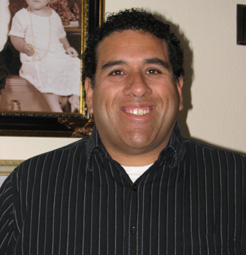
Dr. Sergio Castillo
Up from the Streets
Sergio Castillo grew up in the inner city of Northeast Los Angeles surrounded by gangs, violence, drugs, and alcohol. Although drugs and alcohol weren’t temptations, peer pressure and the need to fit in led him in that direction. In elementary school he started to get into trouble. In the 9th grade, Sergio recognized that he needed to take a different direction in his life and asked his parents to enroll him in the local Catholic high school.
The Catholic school provided individual attention, discipline, structure, and a stimulating educational environment, which Sergio desperately needed and wanted. Eventually Sergio enrolled at Pasadena City College. As Sergio moved closer to transitioning to a four-year university, the reality of how to pay for college set in.
Though his parents sold nearly everything they owned to help, Sergio was able to cobble together enough grants, including a scholarship from HSF, to get him through his three years at UC Irvine.
While at UCI, Sergio was selected to a participate in a summer pilot program at the University of California, Santa Barbara, that was recruiting high achieving minority students to prepare them for graduate school, which was a great honor.
Self-confidence had always been a struggle for Sergio, but that changed when he was accepted into the California School of Professional Psychology at Alliant University, Los Angeles. He surpassed his own expectations and completed his studies in four years and developed a dissertation on Latino gangs. He can certainly believe in himself now that he holds Bachelor's, Masters, and Doctorate degrees.
After earning his Ph.D., Sergio worked for 18 years with children, adolescents, families and juvenile offenders in a community mental health center in South Los Angeles, CA. Today, he is putting family first, and working close to home with prisoners struggling with significant mental health issues, at the California Department of Corrections and Rehabilitation in Chino, CA. “It’s a tough job,” he says, “but I think I’m making a difference.”
